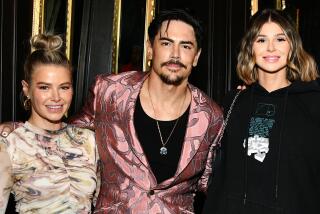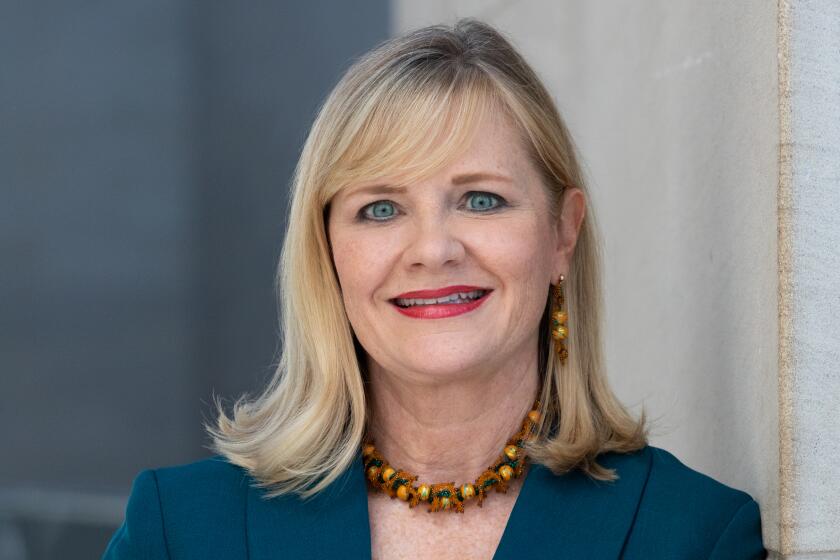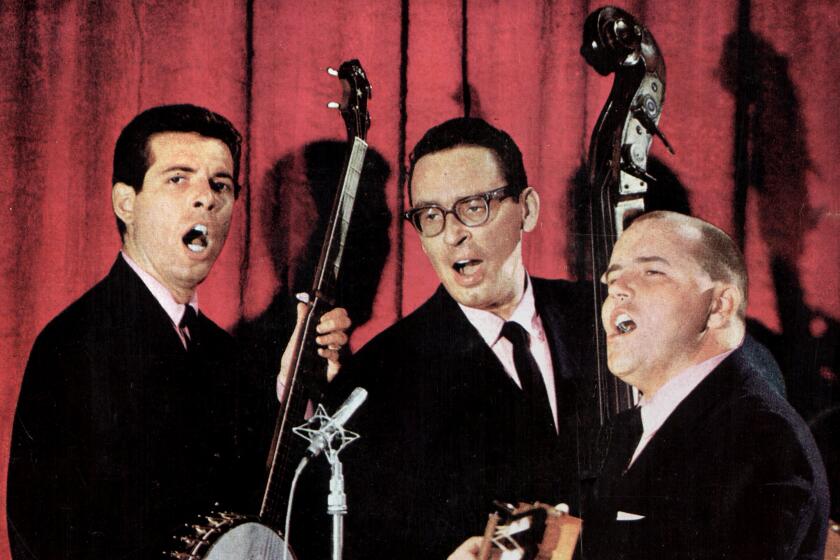Actress at Peace With Her Herself and Career
Yeardley Smith remembers well the first time she received applause.
“It was a high-school production of ‘I Remember Mama,’ ” said the small, round-faced actress. “I’d never done anything extracurricular. I stank at sports; I was too slow and too short. But I tried out for this and got the part of Dagomar--and for some reason, the audience fell into the aisles laughing. It was an incredible rush, unlike anything I’d ever felt before. I didn’t know someone could have that kind of effect on so many people at one time.”
Smith, 24, is currently displaying her comic capabilities at the Tiffany Theatre, playing morose, middle-aged Mary Featherstone in Alan Ayckbourn’s romantic farce, “How the Other Half Loves.”
“I’m finally getting to play people past puberty,” said the actress (“Shakers,” “The Figure”), whose distinctive natural voice--a kind of plaintive nasal croak--has become her trademark. “In this, I’m an actual frump. It says in the script, ‘Mary wears a fairly awful dress.’ So I went to various department stores before I found the right dress. I said to them, ‘You’re not really going to sell this to me, are you?’ ”
Bad clothes are just part of Mary’s problem. Besides running awkward, unwitting interference for the play’s adulterous lovers, her character must weather the slings and arrows (and occasional slaps) of a callous, churlish husband.
“I never had any problem with that,” Smith said of Mary’s marital subservience. “When I did ‘Boys and Girls/Men and Women’ (Odyssey, 1987)-- that role was hard to play. It was very close to what I used to be. Like Esther, I was always having those friends who’d stomp all over you--and you’d let them, because you wanted so much for them to be your friend.”
The casting process often reinforces those basic physical stereotypes. “It’s usually character stuff that I’m offered,” Smith said with a shrug, “unless they want a real offbeat leading role. Most of the time, I’m everybody’s best friend. Or their annoying friend. It’s like the story of my life. I will never get to play the Cinderella roles . . . “ She stopped mid-sentence. “No. I don’t accept that as the way it’s going to be. I don’t rule out any possibility.”
Smith hasn’t always been so secure. “I used to wish very much that I (were) different,” she acknowledged. “In my dreams, I was Rita Hayworth, Kim Basinger. I just wanted to be that long, tall drink of water with flowing blond hair and large blue eyes and cheekbones you could actually see--you know, be that. And I wasn’t, so I hated myself. I’d beat myself up, tear myself to shreds.”
She sighed. “Now I’ve made peace with it. I don’t mind it at all; I’d rather be who I am. It’s comfortable. It’s me . But it’s only in the last few years that I’ve felt like this. And it was gradual. I didn’t wake up one morning and say, ‘Wow, I’m great!’ I think I was tired. I got weary of putting so much energy into hating myself. I used to do it with such a vengeance: work out at the gym for five hours, come back and say, ‘ So ? So ?’ ”
She’s also adopted that serenity about her career.
“I’m confident that I will always work,” Smith said simply. “I don’t know why; it’s just a dead certainty. I used to be a lunatic, an absolute maniac. I’d be in one job, worrying about where the next one was going to come from. I mean, I was out of my mind with anxiety. I used to sacrifice everything for my career, (including) one very important relationship. My career was the thing. He was always second, which isn’t fair. It’s not right.”
A native of Washington (where she spent a season at the Arena Stage), Smith arrived in New York at 19--and two weeks later got her first job: understudying the role of the daughter in Tom Stoppard’s Broadway hit “The Real Thing.” Two months later she stepped in as the replacement. Eight months later she left to do the film “Heaven Help Us,” then “The Legend of Billie Jean” and an ABC afterschool special. “I knew it would have to settle down to a realistic pace,” she said. “But the truth is, I wasn’t emotionally prepared when it did . . . undulate.”
She also wasn’t prepared for the hustle involved in such a career, or its social demands. “The shy girl is not gone,” Smith stressed. “She just takes a back seat when I have to be on. But I’m the actor who slinks out of the lobby to my car after the show. I can’t deal with people face to face. I love that they love what I do. But it’s like, ‘Thank you very much--I gotta go now.’ ”
All shyness aside, Smith is well aware of the presence of ego in an actor’s work. “You choose a role that’s interesting; it doesn’t matter how large it is. I used to go out there and want to be the star so badly, want to be the best, get all the applause. That’s sort of gone now. It used to be that the gratification came from external forces. Now there seems to be more peacefulness inside of me.
“The work has become more important to me than what I get from the audience. The other thing is like a bubble; it bursts as soon as the applause goes away. Maybe you carry it with you for 20 minutes--then you get home and you’re flat. It’s a very quick high. But knowing you did (the best that) you could do gives you a deep satisfaction. That’s all you can ask for.”
More to Read
The biggest entertainment stories
Get our big stories about Hollywood, film, television, music, arts, culture and more right in your inbox as soon as they publish.
You may occasionally receive promotional content from the Los Angeles Times.






